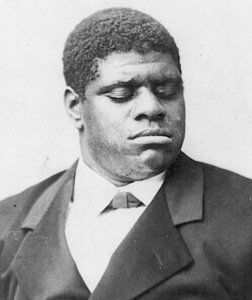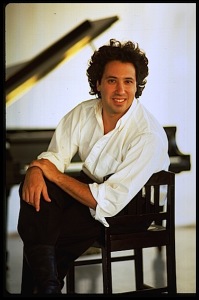John Davis to present Blind Tom at DHS

John Davis remembers exactly when his interest in African-American music began.
As a 10-year-old budding pianist, he shared a love of music with his older brother. The two often would listen to music of all kinds.
One day they came across a record by Sonny Boy Williamson.
“Both of us were completely knocked out by this music,” he said.
Soon Davis became “immersed” in African-American music and literature. As he researched and studied the field, he kept coming across the name of Thomas Wiggins, also called Blind Tom.
Davis will tell about Wiggins’ life and share the music of the prodigy born into slavery when he presents the music of Blind Tom in the Demopolis High School auditorium Friday, Feb. 27, at 7 p.m. The concert is part of the Southern Literary Trail and is free and open to the public.
What makes the music especially important to Demopolis is that Blind Tom performed twice for audiences in the city, on March 4, 1879, and April 25, 1885.
Born blind in 1849, Wiggins was thought to be of no value to the Bethune family of Georgia that owned him. It wasn’t until, at the age of three, he began playing with perfection the music he heard that his worth was appreciated.
Wiggins toured throughout the South and became the first African-American entertainer to perform in the White House.

Davis, making his first professional appearance in Alabama for the Trail’s concert series, began collecting Wiggins’ compositions beginning with research in the library at Julliard, where he was a student. He added to his knowledge at the Library of Congress and Lincoln Center. He managed to acquire some of Wiggins’ work and photocopied others, but Blind Tom’s popularity has grown so that in recent years Davis can’t afford them.
Davis plans to perform works by Wiggins “that capture his unique pictorial style.” He said Wiggins “had a particular knack for portraying things visually through music.” He will play “The Rainstorm,” which Blind Tom composed when he was five, and “The Battle of Manassas,” a musical portrayal of the first Battle of Bull Run and perhaps his most famous.
Using video projection and piped-in sound and voice-overs, Davis will tell of Wiggins’ life and how, after emancipation, the Bethunes retained guardianship of the autistic pianist and deprived him of the large profits that his concerts made. Tom died a pauper in Hoboken, N.J., in 1908, but his legacy survives thanks to his own achievements and to Davis’ efforts.
Davis, a Steinway Artist, will perform in four cities as part of the Southern Literary Trail events this year, returning the music of Blind Tom to the Alabama towns where the pianist originally appeared. Davis has recorded and released two CDs with Tom’s compositions.
Although Davis has lived most of his life in New York and New England, he claims to be a Southerner since he was born in Chapel Hill, N.C. He began studying piano “pretty much from the start” at the age of five or six.
“I remember very early on feeling that was my natural mode of expression. I loved the feel of the keys and the power of being able to control how each note would sound, and the lushness of the piano as an instruments. I felt like it was a very direct way to express my feelings.”
Davis also enjoys sports, and he found the piano athletic in some ways. “It was a combination of my athletic instincts and my intellectual instincts and my heart all at the same time.”
Local partners for Davis’s performance in Demopolis are the Two Rivers Arts Council, the Marengo County History and Archives Museum, the Marengo County Historical Society, the Demopolis Public Library, the Canebrake Players, Friends of Gaineswood, and the Tiger Arts Guild at Demopolis High School.
In addition to grants from the Alabama State Council on the Arts and the Alabama Humanities Foundation, grant support for the Demopolis programs is provided by South Arts, a partnership with the National Endowment for the Arts (NEA).
Davis also will perform at Mobile’s Laidlaw Auditorium on the University of South Alabama’s campus, Sunday, Feb. 22, at 3 p.m.; the Dinah Washington Cultural Arts Center in Tuscaloosa Wednesday, Feb. 25, at 7 p.m, and the Chapel at Tuskegee University in Tuskegee on Thursday, Feb. 26, at 3 p.m.
